Velotric has been on a winning streak lately, spending the last year or more rolling out a series of impressive new reasonably-priced electric bike models with features and performance that handily beat the competition in several key categories. And by all indications, the company has no plans to slow down. The latest new update to the Velotric line comes in today’s announcement of the Discover 2 commuter e-bike. And you better believe we’ve been testing one out in secret to give you our early impressions.
The Velotric Discover 2 has a surprising number of new features and innovations that seem to check nearly every box for commuters. The company has definitely been paying attention to feedback from riders and seems to have implemented just about everything we’ve wanted in the newest edition of the Discover.
From the new torque sensor to the upgraded display, from the Apple Find My bike tracking to the hydraulic suspension, the bike is better than ever.
See what I mean in my video review below, then keep reading for all of my thoughts on the new model!
Velotric Discover 2 Video Review
Velotric Discover 2 Tech Specs
- Frame: Aluminum step-through
- Motor: 750W continuous (1,100W peak) with 75 Nm of torque
- Battery: 48v 14.7Ah (705 Wh) with certified Samsung/LG battery cells
- Top Speed: 28 mph (45 km/h) on pedal assist or 20 mph (32 km/h) on throttle
- Max Range: Up to 75 miles (120 km) on pedal assist
- Transmission: Shimano Altus 8-speed derailleur
- Brakes: 180mm hydraulic disc brakes
- Tires: Kenda 27.5 x 2.4″
- Certification: UL2849 & UL2271 for battery and e-bike system, plus 150% of ISO 4210 test
- Price: $1,699
- Additional features: 80 mm travel hydraulic suspension fork, included rear rack, front and rear fenders, integrated front and rear lights including brake light and rear turn signals, locking battery, color display with USB-C phone charger, 3A charger, kickstand, Apple Find My geolocating tracker, adjustable handlebars, thru-axle front wheel, and included assembly toolkit.
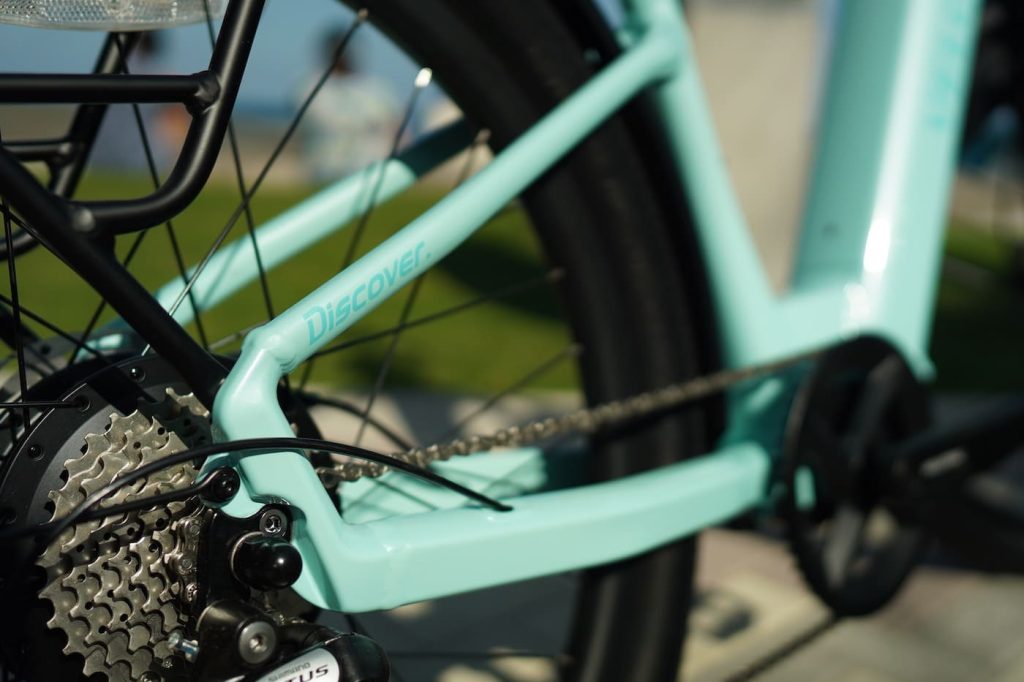
There are a LOT of new upgrades on the Discover 2, and they start with the performance.
The new motor is not only a 750W continuous-rated motor, meaning it puts out more power than most commuter bikes, but it has a true peak wattage of around 1,100W. That’s the real power you feel when climbing hills or accelerating hard. And with 75 Nm of torque, it’s also one of the torquiest hub motors on the market – especially among commuter e-bikes. But even so, the power still feels nicely controllable, it’s not lurchy or jumpy.
That’s likely because of good power ramping programming as well as the included torque sensor, which gives the pedal assist a comfortable and natural feeling right when you start pedaling. Unlike cadence sensors, torque sensors are a much more refined way to control the motor and simply give a better user experience that makes the e-bike feel like a part of you, not a machine that starts and stops beneath you.
Those who spend less time pedaling and more time using the throttle will likely enjoy the paddle-style thumb throttle. To me, it feels like a better way to control a thumb throttle than the more common “push down” style, as the forward push gives less thumb fatigue and feels more comfortable. And the ramping is nicely designed to give you good power off the line when engaging the throttle, yet not overwhelm you with sudden lurching.
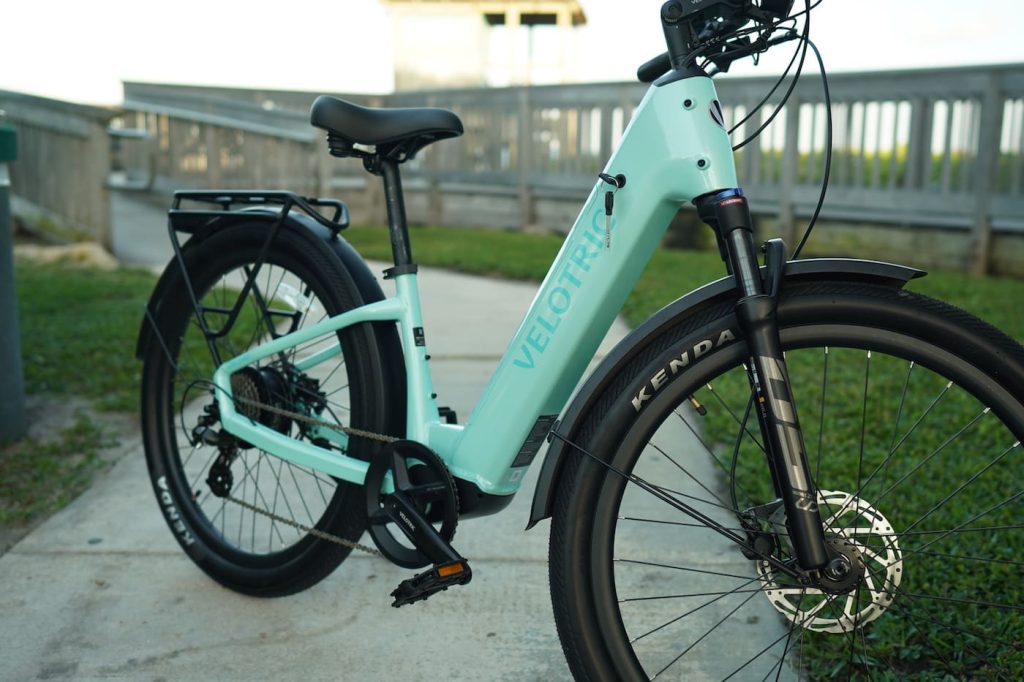
On the bike components side, we’re looking at excellent hydraulic disc brakes on 180 mm disc rotors. That’s important since the bike can reach speeds of up to 28 mph (45 km/h) on pedal assist, or 20 mph (32 km/h) on throttle-only riding.
When you’re going that fast, having strong and consistent braking isn’t just a comfort consideration – it’s a necessity! So I’m glad to see that Velotric put quality hydraulic disc brakes on the Discover 2.
The 8-speed Shimano shifter is also an upgrade over most entry-level transmissions on basic commuter e-bikes, though to be honest I think a lot of people will end up leaving it in a higher gear thanks to the handy throttle. But I definitely enjoyed keeping the power level lower and using pedal assist with the comfortable torque sensor, so the gear shifting came in handy there.
If you’re someone who does enjoy pedaling (and I recommend you try, even if you’re normally a throttle fan!), then that transmission will be a welcome feature.
Plus, there are now 15 (yes, you read that right, fifteen!) pedal assist levels. We’ve still got the typical levels 1-5, but there are three profiles of Eco, Trail, and Boost modes. They modify the power and delivery, giving you different feels and responsiveness for different types of riding. With 15 pedal assist levels, you’re never going to struggle to find the right power level for the situation.
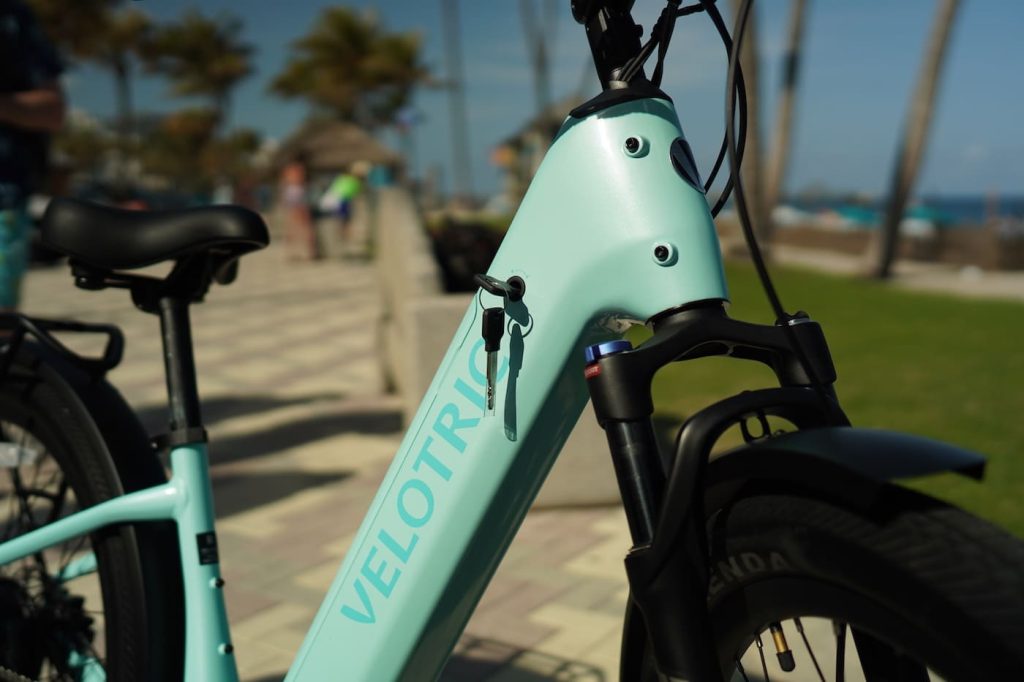
The front suspension comes from an 80mm travel hydraulic fork. Not only is that more travel than you’ll generally find in most commuter e-bikes (many have zero suspension), but it feels better because it’s true hydraulic suspension instead of a cheap spring.
There’s no rear suspension, but I did notice that the seat tube ends quite low, which means you have a lot of the seat tube left extending out, leaving room for swapping in a nice suspension seat post if you’d like some extra suspension in the rear. The other benefit there is that it also means you can drop the seat nice and low for shorter riders, though you’d probably run out of room for swapping in a suspension post if you’re a shorter person.
Shorter riders also likely have shorter arms, which means they’ll enjoy the adjustable handlebar stem that lets you dial in the handlebar position to something that is most comfortable for you.
The whole bike just feels like thought was put into the ergonomics and it wasn’t just slapped together willy-nilly like a lot of e-bikes these days. Features like the adjustable brakes help dial in the fitment even better. And considering Velotric has their own frame design, plus tests the bike to 150% of the ISO 4210 standard, you can tell it’s built to handle more than it’s rated for. Features like the thru-axle front hub instead of weaker, cheaper axle skewers show just how rugged the bike is designed to be.
Speaking of which, with a 440 lb (200 kg) max weight capacity, the bike is built to handle a lot of weight! The rear rack alone can even support a small child, though it looks robust enough that I feel like I could ride on the back with a friend pedaling. Please don’t try that at home. In fact, don’t try that at all, Velotric definitely doesn’t endorse it. But that’s a seriously solid rack, and it looks so much stronger than its 66 lb (30 kg) weight limit rating.
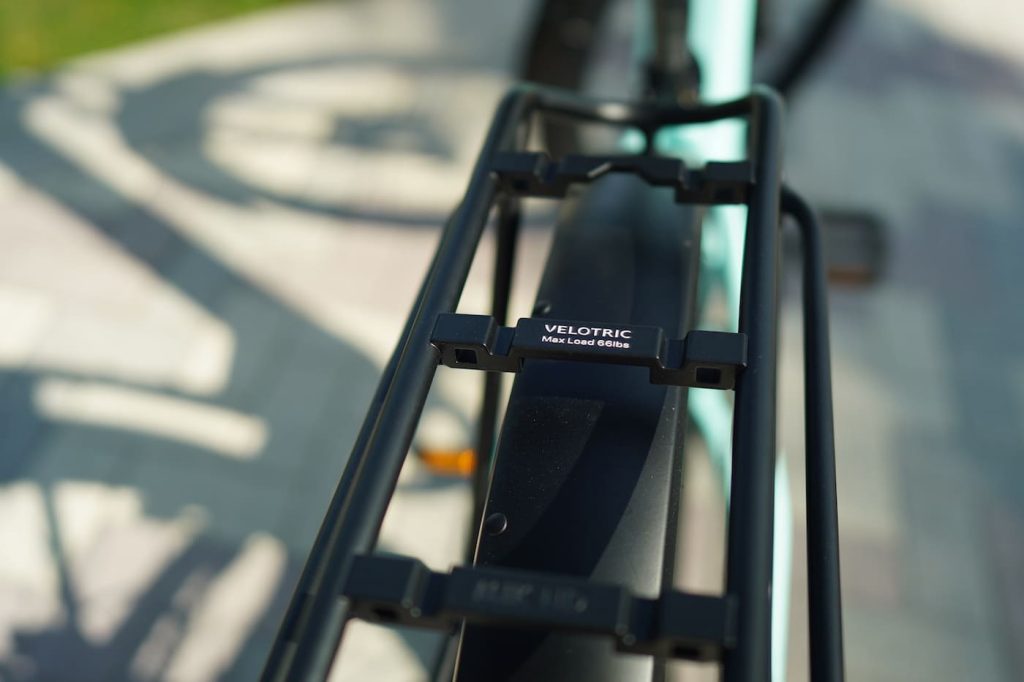
Somewhat amazingly, the battery for the Velotric Discover 2 is actually IPX7 rated, meaning it can be submerged in several feet of water. I literally dunked it in a tub of water, pulled it back out, shook the water off the connector in the bottom of the battery, and started the bike back up to ride it. You can’t do that with just about any other e-bike battery!
The rest of the bike is IPX6 rated, meaning it can withstand high-pressure water jets. In fact, you can even pressure wash the bike (something many manufacturers explicitly say not to do, since it can damage other e-bikes that aren’t as highly waterproofed as the Velotric Discover 2).
Most people won’t end up pressure washing their bike, but it’s nice to know it can handle it. That peace of mind is also great for anyone who rides in the rain, since a battery that can be dunked and connections that can be pressure washed will simply laugh in the face of rain!
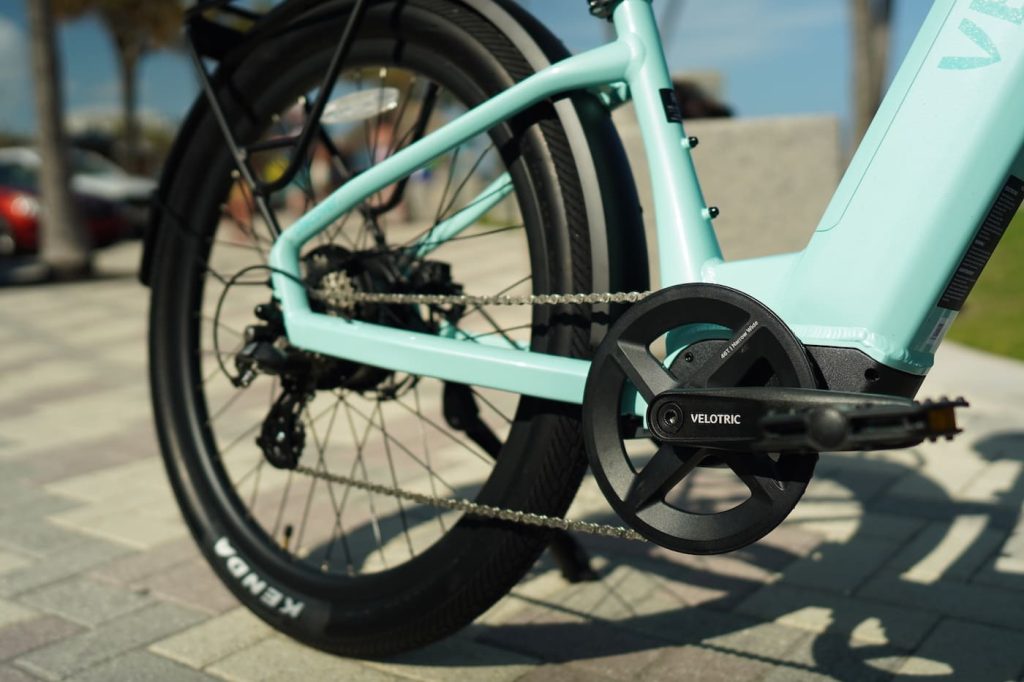
Of course no e-bike is perfect and I’d be remiss if I didn’t tell you where the Velotric Discover 2 struggles, too.
At 63 lb (28.5 kg), the Velotric Discover 2 isn’t lightweight by any stretch of the imagination. I lifted it a couple times to put it in the back of a truck and it was definitely doable, but still not easy. I preferred to lift the front wheel first, get it in the bed, then lift the rear. That means you’re only lifting around half the bike’s 63 lb weight at any one time, and it makes it easier. But it’s still not a lightweight bike!
The bars are also a bit wider and backswept, which may feel new to dedicated commuter riders who are more used to narrower straight bars. As someone who often rides between cars, I tend to favor those narrow urban bars. I’ll admit, these are more comfortable (and almost give me slight cruiser vibes that match the upright and comfortable seating posture), but they’re wider than some may expect.
All in though, I’m super happy with what Velotric has put together here. The Discover 2 is a powerful yet controllable e-bike that can handle any commuter or recreational riding needs. It’s ruggedly built, has plenty of range, and can survive for years of faithful riding with a design that prioritizes quality construction.
That’s exactly what I want to see in an e-bike that I depend on for my daily rides!
FTC: We use income earning auto affiliate links. More.



